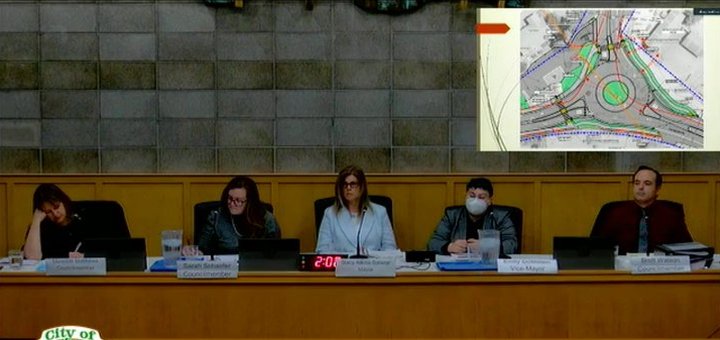The Arcata City Council during a meeting on Wed. Feb. 16 | File photo
###
During last week’s Arcata City Council meeting, Councilmember Brett Watson revealed that he suffers from a learning disability.
Watson, who has served on the council for nearly five years, has been given strict rules about when and how he can interact with city staff following an undisclosed incident that is currently under investigation. This newly limited access to staff, combined with his disability, is interfering with Watson’s ability to do his job, he says.
Watson made his disclosure as the council was questioning staff about details of the Old Arcata Road Rehabilitation project. He voiced concerns about the cost of the project and potential threats of litigation but said it was important to go over every detail, a task he found nearly impossible on his own.
“I did request several hours of staff time to help me understand this project, being that it is so large and complex,” Watson said during the meeting. “And a lot of people don’t know that I also have a learning disability that makes it so I need a lot more time to read information than the average person. I also need complex information to be explained to me by someone in person or over the phone for me to comprehend it.”
Watson added that he’s been limited to just 30 minutes of staff time each week, “per the council’s request.” After persistently requesting more staff time, Watson said, he was granted another hour prior to Wednesday’s meeting.
Following the meeting, Watson told the Outpost that he has suffered from attention deficit/hyperactivity disorder (ADHD) for most of his life, though he was not diagnosed until about five years ago.
“I think reading is the biggest thing,” Watson told the Outpost in a phone interview last week. “It’s really hard for me to comprehend information that I get from reading. Your mind wanders a lot. I have to read things multiple times … . And it affects my memory. It’s hard for me to recall stuff sometimes and I need stuff explained by a person. It helps with my focus and engagement.”
When asked why he had never disclosed this to the public before, Watson said he didn’t consider it an issue. When he was appointed to the council in 2017 he did tell staff and the other council members about his disability, he said, adding that they were very understanding and accommodating.
Although it does take him longer than the average person to comprehend certain written information, Watson was always given as much extra staff time as he needed. When Watson then ran for election in 2018, he said, he felt comfortable with serving on the council and confident that his ADHD did not present an insurmountable problem. He felt that this private medical information wasn’t something that needed to be shared with voters.
So why share it now? Watson told the Outpost that he wanted to explain why he felt it necessary to abstain from the vote until he had more time to review the lengthy text. The one hour of staff time he got wasn’t enough for him to comprehend the material. Watson told the Outpost that, depending on the complexity of the materials, he used to spend about five hours per week with city staff — all in person.
Though last week was the first time Watson mentioned his learning disability, it was not the first time he mentioned not being granted the staff time he requested. Watson brought up the issue during a meeting in January, while the council was discussing the high-profile Valley West hotel housing projects. The conversation quickly turned uncomfortable when Watson asked how the rest of the council felt about him not having access to staff, and Mayor Stacy Atkins-Salazar said she didn’t think the council was “legally allowed to speak on that.”
A few days after that meeting, the City of Arcata announced that it was investigating “potential violations of the City’s Anti-Discrimination and Harassment Policy” by Watson. The council also adopted “special protocols” governing how Watson is to interact with staff as a means of “restricting his contact with potential victims and witnesses.”
What the “potential violations” are has remained unclear, as no one can comment on the ongoing investigation. Watson said in his response that he did nothing to warrant such an allegation. He has since maintained that he doesn’t know what this is all about.
The whole situation is the latest in a series of unusual and uncomfortable circumstances surrounding Watson. In August of 2021 Watson was arrested for DUI and drug possession, after which he issued a public statement saying he was struggling with the one year anniversary of his father taking his own life. About two months later, the council cast a vote of “no confidence” in Watson, right around the time he entered into a 30-day rehabilitation program.
Since Watson’s return to the council, meetings have often been marked by tension. Several times, Watson has been the lone dissenting voice on city issues. With councilmember Emily Goldstein recently resigning to care for her family, the council will be down to just four members until another new person is elected in June. Some community members worry about the council’s ability to function properly.
Chris Richards – Arcata resident and owner of Chris Richard Automotive – has written emails to the council and city staff expressing his concerns over the drama and apparent confusion at Arcata City Hall. “I certainly feel – and others in the community I’ve been talking with feel – the confidence level in the council is lost,” Richards told the Outpost in a phone interview late last week.
As someone who operates a business in the Gateway Area, Richards is particularly concerned about the council’s ability to vote on the upcoming adoption of the Gateway Area Plan, which will greatly affect future developments in that part of town.
Atkins-Salazar mentioned during a recent meeting that – because she owns property and operates a business in the Gateway Area — she may need to recuse herself from decisions pertaining to the Gateway Area Plan, which would reduce the council’s ranks even further on Gateway-related decisions.
Richards said that in addition to being concerned about the council’s ability to make important decisions, he is also concerned and confused by the issues between Watson and the rest of the council and city staff. Richards recently requested a meeting to discuss the Gateway plan and was told that some staff members couldn’t attend if Watson was going to be there.
Richards says he hasn’t been able to get any answers about why this is happening and people in the community are spreading some pretty serious rumors, especially following the release of a Mad River Union article that published intra-council texts regarding Watson.
As a constituent, Richards said it is stressful to not feel confident in the council and to feel like the public is being left in the dark about what is going on behind closed doors.
“Whatever issues the city is having with communication/information in regards to Brett and staff are a big mystery for the public and I would hope that there is some way to help everyone understand what is happening … ,” he wrote in an email sent to the city council and the Outpost. “I think it prudent that the city shows more transparency with information that moves to help the public understand what is happening.”


CLICK TO MANAGE